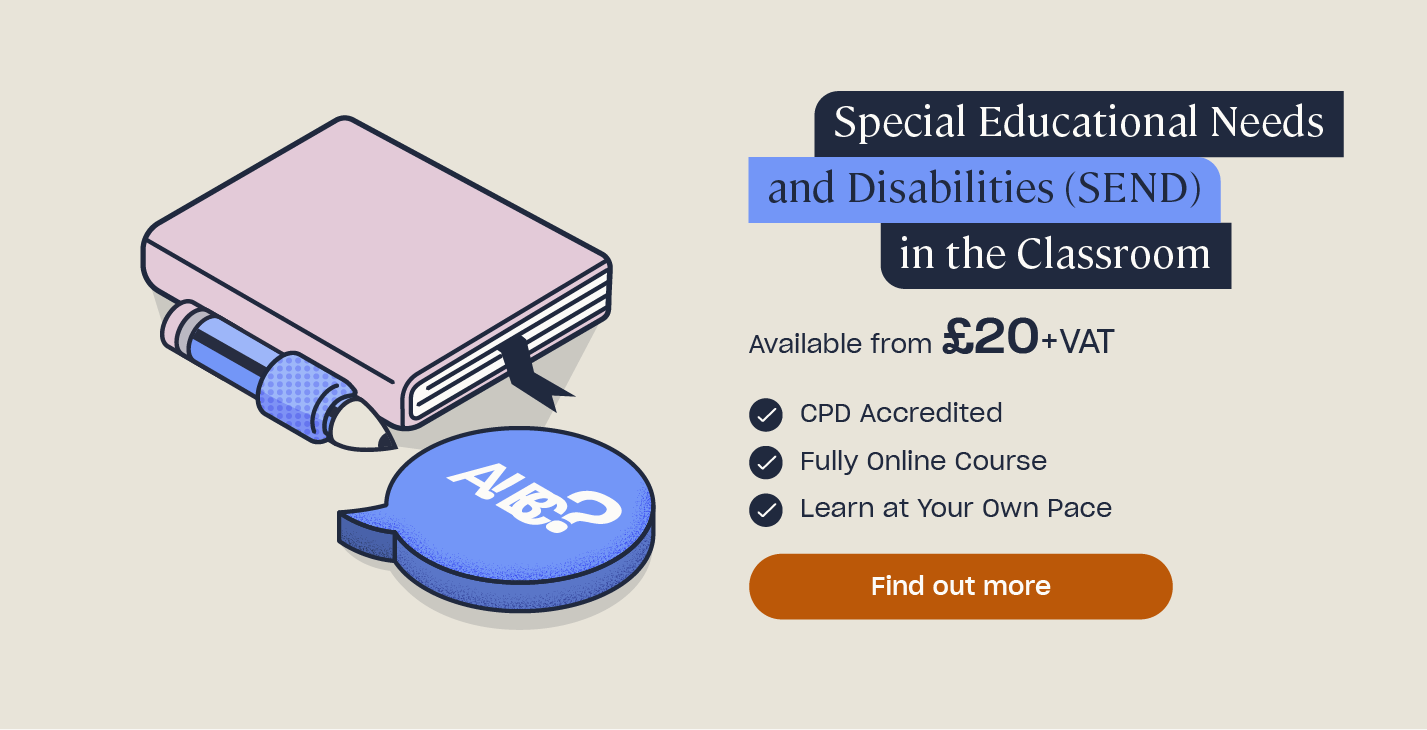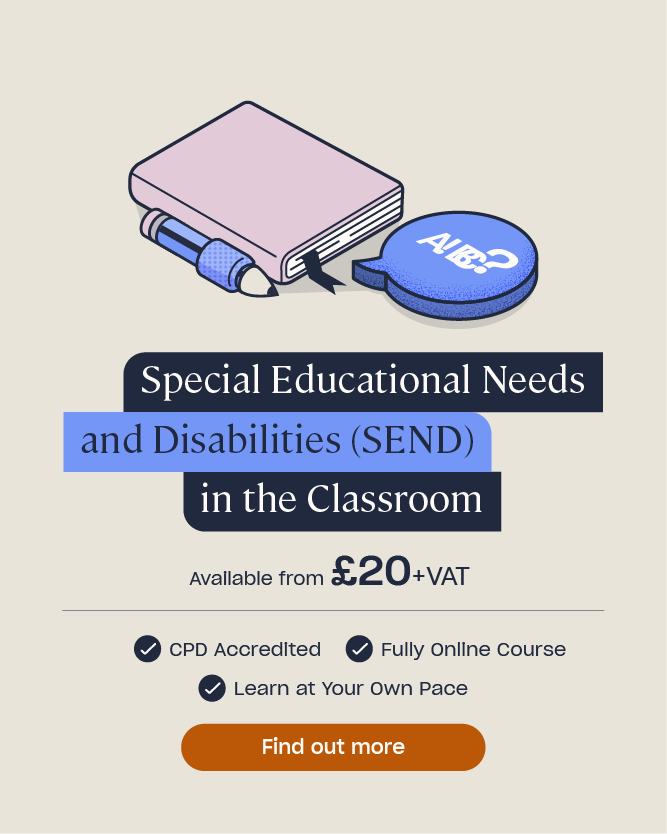SEND Review: Summary of the Green Paper 2022
What is the SEND Review?
At the end of March 2022, the government published its long-awaited SEND review. It was commissioned to improve an inconsistent, bureaucratic, and complicated system which often means delays in children accessing the right support for their needs.
The SEND Review was a green paper setting out the proposals for the future of the special educational needs and disabilities (SEND) and alternative provision (AP) systems. A public consultation ran until July 22 2022, where anyone could respond with their views, thoughts and experiences of the SEND system.
The Special Educational Needs and Disabilities (SEND) and Alternative Provision (AP) Improvement Plan has now been released, aiming to deliver a better system for children and young people with SEND. For more information on what the SEND and AP improvement plan includes and how it might affect your practice, take a look at our article here.
Proposals in the SEND Green Paper
Here is a brief look at some of the main proposals:
A single national SEND and AP system
Currently we have a ‘postcode lottery’ with different local authorities offering different support and provision to children with SEND. The SEND green paper suggests that there is a need for greater consistency and proposes:
- New national standards across education, health, and care which will look at how to identify and assess children’s needs, what type of provision should be available for each type of need, and the support available within mainstream schools.
- Local SEND partnerships to bring together local inclusion plans which meet national standards. Support for parents and carers to find appropriate mainstream, specialist, or independent settings.
- To introduce a standardised and digitised Education, Health, and Care (EHC) plan process and template to minimise bureaucracy and deliver consistency.
- To ensure that the process is more streamlined, and reduce the need of a tribunal though mandatory mediation before appealing to the tribunal.
Excellent provision from early years to adulthood
A more inclusive system ensures that children and young people with SEND are set up to thrive, and are prepared for employment and higher education. The proposals are for:
- Mainstream provision to be improved through teacher training, professional development, and identifying and sharing best practice.
- Introduction of a new SENCo National Professional Qualification (NPQ), to replace the current NASENCo, and an accredited Level 3 SENCo qualification for Early Years.
- Improved funding for school’s budgets, supporting children with the most complex needs, family hubs, internship programs, and improving specialist and alternative provision.
- Piloting ‘adjustment passports’ to support and prepare young people with SEND moving into the workforce.
Alternative Provision
Alternative Provision should be focused on children’s needs. Their purpose is to support children whose behaviour or other needs present a barrier to learning. The green paper proposes these barriers are addressed by:
- Creating a national vision for alternative provision, which enables local areas to ensure that children and young people with challenging behaviour or with health needs get the support they need through, for example: targeted support in mainstream settings; access to alternative provision schools; reintegration from alternative provision to mainstream.
- Having plans for all alternative provision schools to join a multi- academy trust.
System roles, accountabilities and funding reform
Poor outcomes and high costs in the current system could be improved by aligning system incentives and accountabilities. Ensuring clarity in roles and responsibilities should enable local systems to work more effectively together. Proposals for this include:
- The DfE’s new ‘regions group’ to hold local authorities and multi-academy trusts to account for delivery.
- New ‘inclusion dashboards’ to provide a ‘timely picture of system performance’.
- A new local area SEND inspection framework working with Ofsted and Care Quality Commision (CQC).
Delivering change for children and families
Finally, children and young people need systems in place to ensure they are able to thrive and succeed. Parents and carers are frustrated at having to navigate a complex system. Improving and stabilising, through evidence based delivery, and effective feedback will help inform best practice within the system. Proposals to support this include:
- Establishing a National SEND Delivery Board, responsible for overseeing the development of new national SEND standards. This will work with groups such as government departments, local partnerships, and parents to hold partners to account to improve and develop the system.
Want to Develop Your SEND Practice?
Our SEND in the Classroom course will teach you about your legal responsibilities, and best practice with regards to supporting children with SEND. It looks at applying the Graduated Approach, explores each of the four main areas of need, and offers a range of practical strategies to help you provide effective support to children and young people with SEND in your setting.
Responding to the SEND Green Paper
Why should you respond?
In England, there are 1.4 million school-aged pupils with SEND or learning differences, which is approximately four pupils in every class. These children are often unable to reach their personal potential. Families often face barriers in getting the best support available for their children.
The SEND Green Paper is a consultation with the proposals the government intends to put into practice. Some of the proposals may change – we all have the chance to influence the final policy. The consultation can be found here.
Completing the consultation will help to give children with SEND and their families a voice, it provides the ‘opportunity to shape how a new system will work in the future’ helping to guide policy to ensure we have the best system with the right support.

In the meantime, what could you do?
It might be some time before the proposals from the green paper become policy – there are no fixed dates for implementation. As individuals, many of the proposals are out of our control. However, there are a few statements we’ve picked out from the review which you can work towards implementing now to improve the opportunities for children with SEND.
13. We believe that, with excellent teaching and improved identification of need in inclusive educational settings, fewer children and young people will need additional interventions as they will be getting the support they need as part of high-quality teaching within the classroom.
14. … research will build on ‘what works’ initiatives currently underway in the SEND system to identify and share best practice, seeking to include trials on screening approaches to support early identification of special educational needs.
15. Excellent teaching is the bedrock of strong mainstream provision and is especially important for children and young people with SEND: research from the EEF found that teacher strategies, additional teaching, and positive interactions with teachers are important factors for improving the outcomes of children and young people with SEND.
16. The level of confidence amongst teachers in supporting children with SEND is low. In 2019, 41% of teachers reported that there is appropriate training in place for 43 all teachers in supporting pupils receiving SEN support.
Making sure your own level of knowledge and confidence, with regards to supporting children with SEND, is high can help equip you to meet these aims. Speak to your SENCo if you feel there are areas you would like to know more about. Our comprehensive SEND in the Classroom course covers the legislation and principles underpinning SEND provision and looks at how to adapt your practice to provide effective support for children with SEND.
Consider your own:
Inclusive practice. Defining inclusion and ensuring it’s fully embedded in your practice is not always easy, and inclusion is not about placing a child into a mainstream setting and hoping for the best. The learning environment must suit their needs, and that staff need to have specialist skills and training.
High-quality teaching. Universal provision benefits all pupils, though is essential for pupils with SEND. Ensure the basics are right such as providing an effective learning environment, high- quality teaching, and effective feedback.
Knowledge and awareness. Removing barriers to learning is essential, for this to happen, first they need to be identified then reasonable adjustments and adaptations can be made to support learning. By being aware of different needs, you will put yourself in a better position to identify them, and in turn learn how to best support a child. Regularly accessing research and commentary can be a great way to keep your knowledge up-to-date. We regularly publish articles for educational professionals on the Hub. Among our current titles relating to SEND, you can find How to Support a Child with Pathological Demand Avoidance, Supporting SEMH in Schools, What Are Specific Learning Difficulties?, and ADHD: Myths and Facts.
Have You Listened to our SEND Podcast?
In this episode of the High Speed Training Podcast, we are joined by Anita Devi, CEO and Founder at Team ADL, a not-for-profit committed to enabling everyone to thrive in education, employment and life. Alongside Anita is Mike Fleetham, Director and Lead Trainer at Thinking Classroom, an education mentoring organisation that has worked with over 500 schools, local authorities and organisations, and Dr Richard Anderson, Head of Learning and Development at High Speed Training. Click on the link below to access:
With the consultation running until July, now is a good time to reflect on your awareness of current SEND systems, digest the proposals laid out in the green paper, and offer your professional opinions via the consultation.
Further Resources:
- Summary of the SEND and Alternative Provision (AP) Improvement Plan
- Special Educational Needs and Disabilities in the Classroom Training
- Supporting Pupils with SEN in the Classroom
- Effective Interventions in Education: Types and Examples










